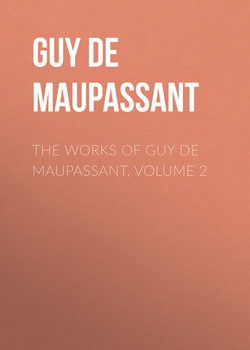Читать книгу The Works of Guy de Maupassant, Volume 2 - Guy de Maupassant - Страница 6
THE FATHER
IV
ОглавлениеYears passed, and François Tessier grew old without there having been any alteration in his life. He led the dull, monotonous life of bureaucrates, without hopes and without expectations. Every day he got up at the same time, went through the same streets, went through the same door, passed the same porter, went into the same office, sat in the same chair, and did the same work. He was alone in the world, alone, during the day in the midst of his colleagues, and alone at night in his bachelor's lodgings, and he laid by a hundred francs a month, against old age.
Every Sunday he went to the Champs-Elysées, to watch the elegant people, the carriages and the pretty women, and the next day he used to say to one of his colleagues: "The return of the carriages from the Bois de Boulogne was very brilliant yesterday." One fine Sunday morning, however, he went into the Parc Monceau, where the mothers and nurses, sitting on the sides of the walks, watched the children playing, and suddenly François Tessier started. A woman passed by, holding two children by the hand; a little boy of about ten and a little girl of four. It was she.
He walked another hundred yards, and then fell into a chair, choking with emotion. She had not recognized him, and so he came back, wishing to see her again. She was sitting down now, and the boy was standing by her side very quietly, while the little girl was making sand castles. It was she, it was certainly she, but she had the serious looks of a lady, was dressed simply, and looked self-possessed and dignified. He looked at her from a distance, for he did not venture to go near, but the little boy raised his head, and François Tessier felt himself tremble. It was his own son, there could be no doubt of that. And as he looked at him, he thought he could recognize himself as he appeared in an old photograph taken years ago. He remained hidden behind a tree, waiting for her to go, that he might follow her.
He did not sleep that night. The idea of the child especially harrassed him. His son! Oh! If he could only have known, have been sure? But what could he have done? However, he went to the house where she had lived, and asked about her. He was told that a neighbor, an honorable man of strict morals, had been touched by her distress, and had married her; he knew the fault she had committed and had married her, and had even recognized the child, his, François Tessier's child, as his own.
He returned to the Parc Monceau every Sunday, for then he always saw her, and each time he was seized with a mad, an irresistible longing, to take his son into his arms, cover him with kisses and to steal him, to carry him off.
He suffered horribly in his wretched isolation as an old bachelor, with nobody to care for him, and he also suffered atrocious mental torture, torn by paternal tenderness springing from remorse, longing and jealousy, and from that need of loving one's own children, which nature has implanted into all, and so at last he determined to make a despairing attempt, and going up to her, as she entered the park, he said, standing in the middle of the path, pale and with trembling lips: "You do not recognize me." She raised her eyes, looked at him, uttered an exclamation of horror, of terror, and, taking the two children by the hand she rushed away, dragging them after her, whilst he went home and wept, inconsolably.
Months passed without his seeing her again, but he suffered, day and night, for he was a prey to his paternal love. He would gladly have died, if he could only have kissed his son, he would have committed murder, performed any task, braved any danger, ventured anything. He wrote to her, but she did not reply, and after writing her some twenty letters he saw that there was no hope of altering her determination, and then he formed the desperate resolution of writing to her husband, being quite prepared to receive a bullet from a revolver, if need be. His letter only consisted of a few lines, as follows:
"Monsieur,
"You must have a perfect horror of my name, but I am so miserable, so overcome by misery, that my only hope is in you, and therefore I venture to request you to grant me an interview of only five minutes."
"I have the honor, etc."
The next day he received the reply:
"Monsieur,
"I shall expect you to-morrow, Tuesday, at five o'clock."
